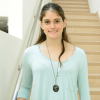
Ladies Lunch
How I helped form a group by and for female scientists
First-year students in the biology department take classes and do rotations. Since we don’t join a lab until the end of the academic year, we have a designated room — “The Pit” — where we have access to books, computers, printers, lockers, and a relaxing lounge area.
During my first year in graduate school, The Pit turned into my headquarters. I formed study groups, bonded with my class, and even relaxed from time to time. Without any real planning or forethought, a “girls corner” started forming. That is, all the girls would spontaneously gather around and form one conversation. Every time we got together, we ended up talking about life in MIT as a woman in biology. After we joined different labs, we all missed the spontaneous “girls corner” — so we strarted to schedule it.
This is how “girls corner” turned into “Ladies Lunch”. A fellow graduate student from my class volunteered to organize monthly lunches and invited a female faculty member. Now other graduate students in biology from other years have joined in and we get funding from the biology department. Ladies lunches are very informal; we gather around, talk about current events and ask our guests about their careers. We talk about being a woman in science and ask for advice as graduate students.
Ladies lunch had brought about interesting conversations about all kinds of topics, including “imposter syndrome,” which is when a high-achieving individual lives in fear of being called a fraud. It turns out female graduate students are among the groups most affected by imposter syndrome. I have also learned how time has changed perspectives about woman in academic settings. We have had female faculty members tell us that they never contemplated the idea of becoming a Principal Investigator (PI), simply because, at the time, there were no female faculty in biological research. I have met many faculty members who took a few years off biology to have children and take care of their families, and years later continued in their academic track. These days, younger faculty members are able to raise children while continuing their academic careers.
I have come to the conclusion that these changes have come about partly through an increasing awareness of the positive impact maternity and paternity leave can have on a woman’s career. Having paternity leave conveys the message that both parents are expected to contribute equally to the upbringing of their children. This change in society’s view seems to have helped in allowing more women pursue academic careers. In addition, we have more women in science being mentors and motivating other women, like me, towards pursuing an academic career. I am glad to be at a place where I get to interact with female faculty members who have been breaking the glass ceiling for woman in science.
Our lunches have also helped me cope with the struggles that come with being a graduate student. For example, I learned that struggling to interpret data and obtain results is normal and part of the learning process and scientific discoveries. Even great PIs had difficult times during their graduate school years. Many of our guests have suggested that we focus on various aspects of our careers, not only research but also on building a good support system.
Attending Ladies Lunch has also impacted my research productivity by teaching me about tips and tools. One of the most useful tips for me was about scheduling. It turns out that Google Calendar is a great tool for planning experiments. I can schedule more than one thing at once, and while I am at a waiting step in one experiment I can start setting up another one, or I catch up on some reading and writing. Also, I can copy events, set up alarms, synchronize it to my phone, and share calendars.
One of the most useful features for me is its flexibility, because things don’t always work out as I plan them. For example, the first time I tried it, I forgot to take into account the time it takes for some reagents to thaw. Now I am aware of the realistic time it takes to start and finish some experiments. Learning how to schedule better has given me more freedom to read and write more, join group exercise classes, and mentor UROPs, and do other extracurriculars.
Ladies Lunch has been a big success. We have added another class activity, planned by the students and supported by the department, called a monthly Data Club. Two students from our class present their research and raise their concerns, while the rest of the class gives insight or asks questions about the research and new discoveries.
The other female graduate students from my class and I missed our “girl corners” from first year because it also gave us a chance to talk about concerns that were specific to our classes and ourselves. Now we get together once per month for a potluck and just talk. We call it “Ladies Dinner.” My classmates, since my first year in The Pit, have given me a sense of belonging in the MIT community.
Share this post:
